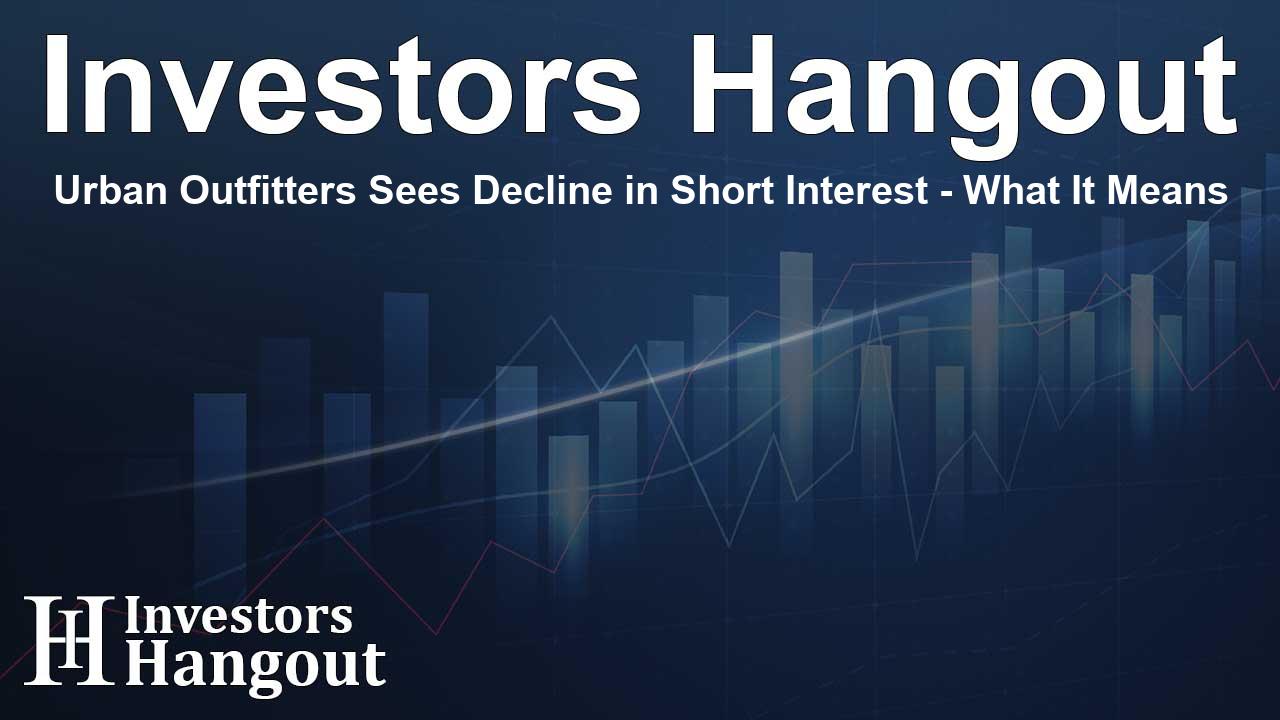Urban Outfitters Sees Decline in Short Interest - What It Means

Understanding Urban Outfitters’ Short Interest Trends
Urban Outfitters, known for its stylish clothing and unique merchandise, has recently shown significant fluctuations in its short interest figures. Reports indicate that the short percent of float has dropped by 3.81% since the last assessment, bringing the total number of shares sold short to a notable 10.37 million. This figure represents around 20.45% of all the shares available for trading.
The Implications of Short Interest
Short interest can be a fascinating indicator of market sentiment. It quantifies the number of shares that investors have sold short but have yet to repurchase, meaning they anticipate a decline in the stock price. In the case of Urban Outfitters (URBN), traders could take approximately 6.47 days to cover these short positions, based on the current trading volume.
When short interest rises, it usually signals that investors are taking a bearish stance toward the company, believing that its stock will likely decrease in value. Conversely, a decline in short interest can suggest increased optimism among investors, potentially indicating that they expect a favorable shift in the company’s fortunes.
Urban Outfitters Short Interest Trends Over Time
The recent decline in short interest for Urban Outfitters does not guarantee a rise in stock prices; however, it is an intriguing development. The market's perception is evolving, with fewer shares being shorted—indicating a shift to a more bullish sentiment.
Comparative Analysis with Industry Peers
It's important to consider how Urban Outfitters stacks up against industry peers. Analysts often engage in comparative analysis, scrutinizing a company's performance in relation to similar businesses. As per recent evaluations, Urban Outfitters has a short interest percentage of 20.45%, significantly higher than the peer group average of 15.47%.
This higher rate of short interest suggests that the market holds a less favorable view of Urban Outfitters compared to its competitors. This disparity raises questions about what unique challenges Urban Outfitters faces in maintaining investor confidence.
The Role of Short Selling in Stock Performance
Short selling can act as a double-edged sword. While it can potentially lead to price declines, it may also create opportunities for gains through short squeezes. A short squeeze occurs when a heavily shorted stock’s price rises, forcing short sellers to buy back shares to cover their positions, which further drives the stock price up.
The phenomenon of increasing short interest can also be bullish, as seen in cases where a company manages to turn its situation around, leading to a surge in stock prices as shorts are forced to repurchase at higher rates.
Conclusion: What’s Next for Urban Outfitters?
As Urban Outfitters navigates market sentiment and stock performance, shareholders and potential investors will be keen on how these short interest dynamics evolve. The reduction in short interest is indeed a positive signal that should not be overlooked while assessing investment strategies.
Frequently Asked Questions
What does declining short interest signal for Urban Outfitters?
A decline in short interest typically indicates growing bullish sentiment among investors, suggesting they have more confidence in the stock's future performance.
How can short selling impact stock prices?
Short selling can lead to price declines, but it can also result in a short squeeze, where rising prices force short sellers to buy back shares, thus escalating the stock price.
What is the short interest ratio?
The short interest ratio indicates how many days it would take for all short positions to be covered based on average trading volume. Urban Outfitters currently has a ratio of approximately 6.47 days.
How does Urban Outfitters’ short interest compare to its peers?
Urban Outfitters' short interest of 20.45% is higher than the average of 15.47% for its peer group, indicating a relatively more bearish outlook from investors.
Is increasing short interest always bad for a stock?
Not necessarily; while it can indicate bearish sentiment, it might also set the stage for a short squeeze, which could lead to significant price increases if the company's situation improves.
About The Author
Contact Lucas Young privately here. Or send an email with ATTN: Lucas Young as the subject to contact@investorshangout.com.
About Investors Hangout
Investors Hangout is a leading online stock forum for financial discussion and learning, offering a wide range of free tools and resources. It draws in traders of all levels, who exchange market knowledge, investigate trading tactics, and keep an eye on industry developments in real time. Featuring financial articles, stock message boards, quotes, charts, company profiles, and live news updates. Through cooperative learning and a wealth of informational resources, it helps users from novices creating their first portfolios to experts honing their techniques. Join Investors Hangout today: https://investorshangout.com/
The content of this article is based on factual, publicly available information and does not represent legal, financial, or investment advice. Investors Hangout does not offer financial advice, and the author is not a licensed financial advisor. Consult a qualified advisor before making any financial or investment decisions based on this article. This article should not be considered advice to purchase, sell, or hold any securities or other investments. If any of the material provided here is inaccurate, please contact us for corrections.
